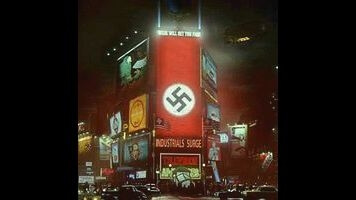Adding some meat to what had been rather skeletal characterizations doesn’t hurt, either. Inspector Kido has been a straightforward villainous presence to this point, although from his point of view, he’s a man of honor doing his duty to country. Since we only see him on the job, he’s been stuck in a narrow range of behavior, but a few small cracks in his facade appear in this episode. His loyalty extends to his wife back in Japan; unlike General Onada, he shows no interest in the attractive young woman assigned to entertain him. Later, when a member of the Yakuza tells him he must release Ed and pin the crown prince’s murder on someone else, Kido follows through (making a convenient patsy of the now-deceased Resistance fighter Karen), but not before torturing Ed further by telling him everyone he knows will be killed if he goes through with his false confession. He’s only softening him up, however, as he appears to have some other purpose in mind for Ed.
Frank, who spent most of the first season as an annoyingly ineffectual milquetoast, is growing a spine even as his methods suggest he’s not necessarily growing a brain at the same rate. As Childan is quick to point out, Frank’s master plan of confessing to ripping off the Yakuza should get them both killed. Mostly thanks to Childan’s hustle, however, they are able to convince their captors that they’re worth more alive due to Frank’s superior forgery skills. To his credit, it’s Frank who is able to save Ed’s life by insisting on his importance to the operation, and they share a teary reunion by episode’s end.
The failings of Joe’s character have been well documented here, and I’m still far from convinced either the writers or Luke Kleintank are up to the task of turning him into an interesting hero. “The Road Less Traveled” takes a few baby steps in the right direction, though, as Joe tries to embrace regular life and put his Nazi days behind him. Believing Juliana to be dead, he gets his job back with the construction company (or at least a worse job at the same place) and resumes a cozy domestic existence with his neighbor Rita and her son. It doesn’t last long, however, as John Smith arrives to tell Joe his father wants to see him in Berlin.
Juliana is not dead, although there’s no shortage of people trying to rectify that situation. With the help of a Resistance-sympathetic truck driver she makes her way back to San Francisco; said trucker then throws Lem and Connell off her trail by misdirecting them to a nonexistent bus to Sacramento. Try as she might, however, Juliana can’t convince her loved ones to leave the city she believe to be doomed. She does discover the identity of the man in Abendsen’s film, however: his name is George Dixon and he’s Trudy’s real father. With Tagomi also unresponsive to Juliana’s warnings and unwilling to help her, she leaps out of the frying pan and into the fire, turning herself in at the Nazi embassy before the Kempeitai can shoot her.
Even with all of this activity going on, it’s Tagomi who is still on the most intriguing journey. When his assistant is unable to turn up any information regarding the Cuban Missile Crisis, Nelson Mandela, Lolita, or anything else Tagomi gleaned from his brief trip to the alternate universe, he pays a visit to the banned books room at the local library. Among the selections there are Aldous Huxley’s Brave New World and one in which Tagomi takes a particular interest, The Varieties Of Religious Experience. This is a real book I’m not familiar with, but per Wikipedia, author William James was more interested in exploring direct religious experiences rather than organized ones, which may explain Tagomi’s curiosity. After all, we’ve been given no scientific explanation for his ability to transcend dimensions; it’s based purely in meditation as far as we know. His search for answers is inevitably attracting attention, which gives him something in common with the rest of the main characters in a world where blending in with the crowd is considered the best practice for survival. At a time when the cast is still largely separated and moving through their own stories alone, this is the thread that connects them.
Stray observations
- Getting another glimpse of the Dragnet-like cop show American Reich is a little disappointing, only because we’ve already seen it and it would be fun to see more takes on alternate universe pop culture. How about a Nazi sitcom? (And no, I don’t mean Hogan’s Heroes.)
- Frank has a disturbing dream about finding a hole in the back of his head, which recalls the film in which he is lined up and executed. When he awakes, Childan assures him that his hair looks fine even though he’s about to die horribly.
- In a Variety interview, producer David Zucker indicates that Spotnitz was involved in this season through episode five, so it will be interesting to see if there’s a noticeable shift in direction or tone at that point.


















![HBO teases new Euphoria, Larry David, and much more in 2026 sizzle reel [Updated]](https://img.pastemagazine.com/wp-content/avuploads/2025/12/12100344/MixCollage-12-Dec-2025-09-56-AM-9137.jpg)






















